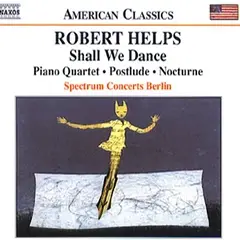




By Jed Distler, Classics Today, May 11, 2004
↑Robert Helps (piano), Daniel Blumenthal (piano) • Spectrum Concerts Berlin (Naxos 8559199)
Next >Robert Helps’ music is hard to pinpoint. It often makes use of dissonant counterpoint in the manner of his mentor Roger Sessions, yet its textural refinement and timbral elegance reflect the composer’s intense interest in Fauré and Ravel (whose piano music, incidentally, he played ravishingly well). Regarding Shall We Dance, the opening selection, I’ve previously commented about the work’s inward, wistful lyricism and petulant arabesques that keep the right hand busily buzzing. The work’s dedicatee, Russell Sherman, made a beautiful recording that honors Helps’ dynamic markings more faithfully than Helps does in this live Berlin performance recorded the year before he died. Yet I slightly prefer Helps’ interpretation in that he takes the slower parts slower and the faster sections faster while spacing his rubatos in longer arcs.
The Piano Quartet opens with an extended, introspective solo piano prelude (gorgeously rendered by Daniel Blumenthal), followed by two brief and ethereal movements punctuated by thick, linear episodes. An eight-minute Postlude for the full ensemble continues in the manner of the Prelude, and the tiny Coda winds down like a slowing timepiece.
The earlier chamber works, however, offer greater textural and emotional variety. I’m especially taken with Postlude for horn, violin, and piano, with its long Mahlerian horn lines, wide open spaces, and carefully wrought climaxes that make lots of noise without sacrificing transparency. Insect-like harmonics and ponticello effects along with strategically placed pizzicatos make a similarly haunting impression in the Nocturne for String Quartet.
It takes supreme technical control and a sixth sense for delicate nuance to fully convey the work’s subtle sound world, and the string players of Spectrum Concerts Berlin command these qualities and much more. In fact, all of the performances are on the highest level. If only the composer had lived to hear them! The John Ireland encore is a souvenir of Helps’ aristocratic, multicolored brand of Romantic pianism that audiences treasured in his infrequent solo concerts, many of which exist in excellent-sounding recordings. Naxos, are you listening?